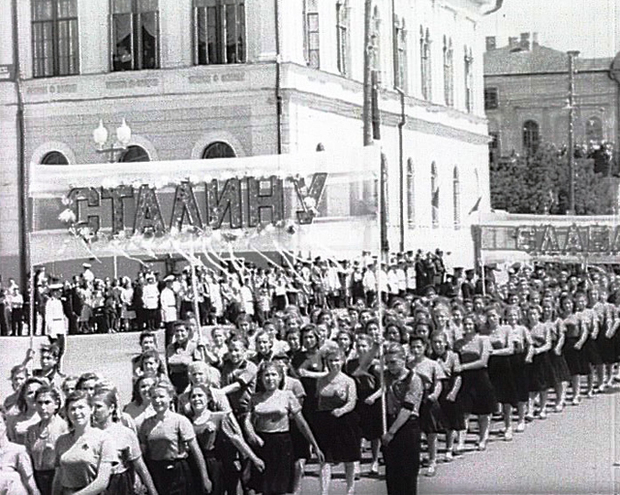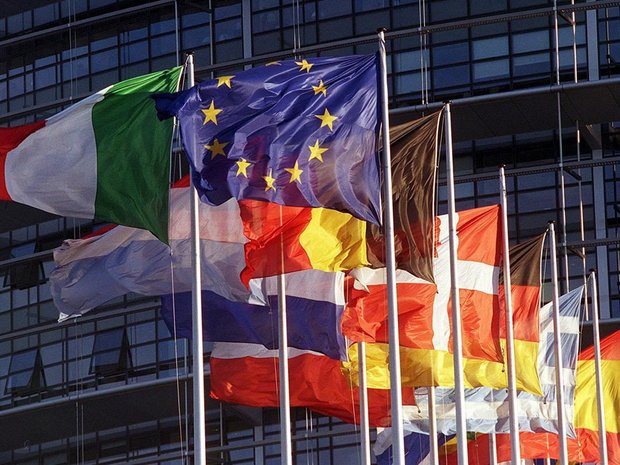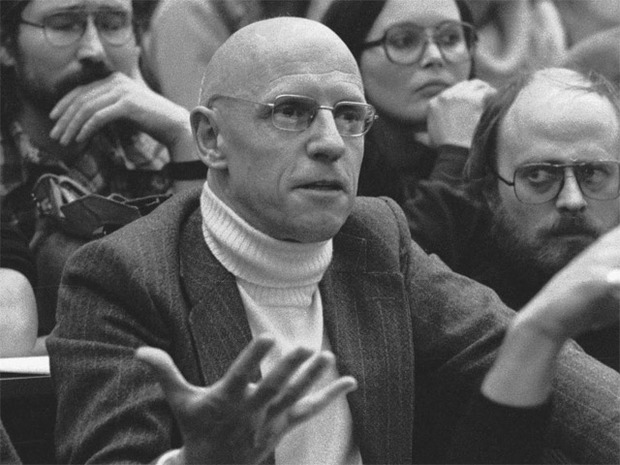''We’ve accustomed to the idea that Europe is united, but we see that it is falling apart at the seams''
Back in the USSR? The transcript of the lecture of the Professor of the Moscow Higher School of Social and Economic Sciences Grigory Yudin in the contemporary culture centre Smena. Part 1
Philosopher and sociologist Gregory Yudin delivered a lecture on ''The myth of the Russian paternalism: how have market reforms changed the ''Soviet person?'' at the contemporary culture center Smena on 11 March. In his speech, the scientist told about the phenomenon of the ''Soviet person'' and why the states by choosing modernisation still move each in its own way. Realnoe Vremya publishes the transcript of the lecture of Grigory Yudin, Candidate of Philosophy Sciences, senior researcher of the laboratory for economic sociology studies of the Higher School of Economics, and Professor of the Moscow Higher School of Social and Economic Sciences.
Russia turns face to the Soviet past
I must say that the Gaidar Fund, with support of which I am delivering this lecture, wanted us to talk about the Soviet person, what is happening to him, meaning that in recent years we have often heard that all these 25 years after the fall of the Soviet Union have not changed anything. That the Soviet person, who inhabited this country, actually has not disappeared, despite a temporary leaving the stage, he came back, and we live in the same country where we used to live. Honestly, I am not a very big fan of the formula of the ''Soviet person'', and maybe because of that or other reasons, the Gaidar Fund has decided to get rid of it. So, before that lecture, we had got rid of the ''Soviet person''. But since this view is not going away, we'll talk about where it comes from, how it can limit our understanding of what is happening in Russia today and what the alternatives are.
The simple plot — the fact that Russia is returning to the Soviet Union — can be decomposed into three main elements. First, the political part of turning back: the return to totalitarianism, which is often mentioned; the return to Soviet ways of organizing political space, the structures of power, the notion that the vast majority are willing to support the ruling regime, regardless of what it does, which naturally causes a well-deserved pride of some people (that there is a strong, unified nation), and the other who have a reasonable concern (because it is disturbing when the majority is ready to support no matter what). That is why they started to talk about the fact that we are returning to totalitarian models, though, we have not come to them yet, but the most scared part of expert and wider community begins to think back to 1937, especially they are afraid of the changes that have occurred in the country over the last 3-4 years, associated in particular with the fact that the Soviet way of organizing of political space returns not only within Russia, but it is also beginning to do what it used to do — expansion. So now we see that the territory of Russia is increasing. A clear evidence that this is happening is the unanimous support of the current regime. Whatever they do, we know that almost any policy that is offered finds popular support. How do we know this? You need to look at the poll results. The polls show that the support is more than serious and weighty. Both the president and the policies he implements enjoy it.
The second part of this turn — economic one. Those who are supporters of market reforms often say they did not give the most important thing — they did not lead to the formation of a responsible individual who would be willing to lead an independent economic life, to make decisions. Instead, we are dealing with the rejection of independence and the fact that people tend to rely on the government, they expect support, they don't really want to take initiative, they have a tendency to take crazy actions and hope that someone kind and good will come and neutralize the consequences of their actions.

The third part of the turn — historic. We often see how in popular culture and historical politics the return to the Soviet model is taking place, it is expressed in the glorification of the Soviet past and the contemptuous attitude to the nineties when there was a departure from the Soviet past. We see that the Soviet past increasingly fascinate: someone with pleasure, and someone out of habit, and someone with anger — we all sing some ''old songs about the main thing'', and year after year they become louder and louder. There are different points of view about whether it is good or bad, but there's sort of a return to the Soviet Union in history as well.
Hence is the hypothesis offered by the most vivid proponents of the term ''the Soviet person''. It lies in the fact that anthropology prevented reforms and departure from the Soviet past. There is something deeply rooted, growing out of the ground which stopped reforms, and its name — ''the Soviet person''. People who carried out the reforms were naive, they thought that it was possible to change the institutional environment — and all change — but no, the Soviet person was stronger. The Soviet person, as you know from the previous three points, is an irresponsible paternalist — one who is ready all the time to rely on strong power, constantly actively support it and be responsible for nothing.
How the Soviet person stopped the locomotive of modernization
Let's ask ourselves, where does this notion of the Soviet person come from? It is taken, of course, from the ruling theoretical language which is in use today predominantly in all the social sciences in Russia and in the expert community, which is powered by these sciences. This language is the language of modernisation and the theory of modernisation. There are several components within that can be roughly reduced to the same three. This language, which was popular in the nineties, it assumes political modernization from something that we call authoritarianism, something that we call democracy; economic modernization — from the planned economy to the market economy; and finally, historical modernization — the transition from conflict to reconciliation: we were living in the era of the cold war for a long time, but cold war ended, we move to one model of development, there is a convergence, and hence the hypothesis about the end of the history, voiced by an American, quite conservative theorist and political strategist Francis Fukuyama. Roughly speaking, these three transitions can be described as transitions from bad to good. Progressive development from a wrong situation to a more correct and desirable one.

''We were living in the era of the cold war for a long time, but the cold war ended, we move to one model of development, there is a convergence, and hence the hypothesis about the end of the history, voiced by an American, quite conservative theorist and political strategist Francis Fukuyama.'' Photo: ru.krymr.com
It is here where joins the figure of the Soviet person who comes into the locomotive of modernization, which rushes at full speed and sharply presses the brake. A pest, which failed to be cleaned up from the salon, at the decisive moment came in the cabin and forced the engine to stop, he has not been taken into account. This figure is usually needed in order to explain why modernization does not occur.
This theory, of course, has big problems, and they are not only in Russia but also worldwide. It is still influential worldwide, although not as uncontested as in Russia. But there is an obvious difficulty in how to explain the fact that the expected changes forecasted in the process of modernization do not occur. Those countries that embark on a path of modernization, far not all of them go on the planned scenario, not all of them transit in a relatively democratic state. In short, far not all of them begin to resemble the countries of Western Europe and North America.
Those that successfully pass this way represent something special, unique and hardly reduced to a single sample. Poland had long been considered the ideal model of modernization in the socialist block, but today we see that Poland abruptly departs from those samples that seemingly were to finish its story and to bring it to a state of prosperity. So, this theory has to use ''concept-patches'' in order to cope with these problems in some way.
These ''patches'' can be divided into two categories. The first one is ''black boxes''. You have probably heard many times about them, and they are really on the tip of the tongue when one fails to explain why a country does not follow a common path. This may be due to the fact that they have ''archetypes'' or ''their own special mentality'' or that ''it finally got in a rut and since that it has been going it''. With all these concepts, the problem is that they are impossible to determine that they have universal explanatory power, through them it can be explained anything, but, first, they are impossible to determine, and second, every time they are used in the case when it is impossible to explain why the basic theory does not work which, in fact, does not provide these concepts. If you have modernisation, so it should happen for all countries equally. Why would some sort of archetypes must be there?
The second type of the ''patch'' is the concepts-hybrids, which are used to describe a situation, which turned out to be intermediate between the one and the other. That is why now we have a surge of these hybrid concepts around the world. These terms are used in particular for what we have in Russia: authoritarian democracy, or electoral authoritarianism. Another term, under certain circumstances similar — state capitalism. This is not a meaningless term, but it also represents an attempt to desperately cope with the fact that we have both a strong state and a market economy.

''Those countries that embark on a path of modernization, far not all of them go on the planned scenario, not all of them transit in a relatively democratic state. In short, far not all of them begin to resemble the countries of Western Europe and North America.'' Photo: pronedra.ru
''Democracy that exists in Western Europe and North America is a good thing''
Thus, ''concepts-patches'' eloquently point to the fact that it is something wrong with the theory. Finally, the distinction between theory and ideology erases, it ceases to understand its own background, to be critical towards itself, and all of these ''concepts-patches'' are used in order to save its ideological content. I've said enough nasty things, now maybe it's time to answer the question – what I suggest, what is the alternative.
I will tell about several steps that are used within those disciplines that I do. One of them is the political theory. In Russia, there is a lot of confusion about what political theory is and how it differs from political science. A short explanation about this: there are two meanings of the political science, one of them is really bad: in Russia so it happened that political scientists are people who are close to the corridors of power, have influential friends and hear the latest insider information. They often appear on radio and television, they usually look very seriously because they have some source of information that they can boast of and something to tell others. But it is a very difficult case. In a more appropriate case, the political science is an established science in the world, but it is mainly characterised by the fact that it has obvious prerequisites. In particular, the dictionary, about which I have spoken — the dictionary of authoritarianism and democracy — it is its dictionary. It comes from the fact that there is a certain category of regimes, and further it examines the issue of how transitions happen from one of these regimes to another. This, of course, does not fully cover its tasks, but it's its prerequisites, and it implicitly assumes that democracy — one that exists in the countries of Western Europe and North America — is a good thing, and so we need to investigate how we move from the poor state to the good one.
Political theory, in contrast, makes no such assumptions. It is not so obvious for it that the status that we have today in Western Europe and North America, so desirable and perfect, and moreover — it is not so evident that it ever can be called democracy. Rather, it is knowledge about how the political organization of people in different historical periods goes in different cultural conditions, but, nevertheless, what these principles have in common. This discipline is not ashamed of its normative content. In other words, it studies not only how the world works and how the regimes are classified, but also quite clearly states their claims to tell us how the world should be organised and how we should organise society around us.
The second discipline that I do — in MSSES, also known as Shaninka, I head the master's program in political philosophy, it is also political theory, and within the framework of political theory, one of the most interesting areas is all that is associated with studies of subjectivity, anthropological research of what the modern person is.
There is also an obvious opponent. If it is political science for political theory, then for the anthropology of subjectivity it is primarily economic science and all the disciplines that are based on the simple assumption of economic science — that people are rational and seeking to maximise their own utility. It has long been the dominant premise in the economic science, it further extends to related disciplines, in particular, by the way, to political science. For the anthropology of subjectivity, this is not an obvious thing, it is not very clear for it what it is, why should we accept this hypothesis, whether we miss something important, and if we do, then how it turned out that humans are rational, maximising their own pleasure beings. It looks for this historical and anthropological explanation.

''Today we see many states that call into question the existence of the Eurozone — not as a financial space but as the European Union.'' Photo: meduza.io
''We've accustomed more or less to the idea that Europe is united, but we see that Europe is falling apart at the seams''
There is also a number of basic assumptions regarding the nature of modern societies. In the first place, here I will rely upon the work of French political philosopher and philosophical anthropologist Michel Foucault. From what does Foucault proceed? From that power in modern societies have economic nature. What does it mean? This means that in normal cases, modern cases, policy field is almost completely replaced by economics field. People have little interest in political life in its original sense — in somehow organizing an argument, a discussion or joint action on how to live further. They are rather more interested in economic issues, profits, maximizing their own success and they are willing to transfer authority to the one who most effectively maximizes economic welfare.
This is a distinctive feature of modern societies because recently, only 400-500 years ago, it has been different. The situation when the economy is the main thing in our life has occurred recently, and this is a great discovery of Michel Foucault. What are consequences of the emphasis on the economic and the displacement of politics by economics? There are a number of consequences, and I'll tell about a couple of them because hereafter I will comment on them through research, which I did, conducted with my colleagues.
First, it is a high inequality because we find ourselves in a world where economic success is the most valued and we must match the model of economic man, about which I have said: each of us must take care of maximizing our own efficiency and wealth independently, and since it inevitably leads to harsh and even cruel competition, destroys solidarity and cooperativity between people, one of the natural consequences of this becomes high and, moreover, growing inequality. Inequality to a certain point seems legitimate, acceptable, and nobody disputes the fact that it should exist because it is believed that each person should be responsible for their own destiny. For example, if someone has not achieved something in life, it is by and large his fault, everyone should be able to handle himself. There are more successful, talented and effective — they get more, and there are some losers who earn less, it is their loss, it is their own responsibility.
Here is a picture to illustrate this observation and why it has recently become increasingly popular, although Foucault formulated it before it became obvious. Perhaps you are aware of Tomas Piketty's book Capital in the Twenty-First Century. This picture is from there. In it, Piketty shows that inequality is growing in the world today. Here is the percentage of share of income of 1% of the richest in different countries. Since the beginning of the century the trend was in a fall, and starting somewhere in the 1970s it went back up and in some countries came to starting points: inequality in the world is actively growing, the rich are getting richer relative to the poor. For example, half of global wealth accounts for 1% of the richest and ¾ for 5% most wealthy, this is data from a recent study by Swiss Bank. There are studies with a different methodology, but the trend is roughly the same.
All of this sets some unpredictable effects, with which the prevailing theory, which is, in fact, the modernization theory, is not able to cope with. We know all these effects. It is what has recently surprised experts around the world. It is what they cautiously call ''the return of the masses'' and that is reflected in the rise of populist leaders around the world, leaders who are completely differently arranged. They do not resemble typical leaders of the liberal democracies, but unexpectedly they turn out to be successful in them. It seemed that everyone thought that this cannot be true, that the regimes were perfectly built and they would not allow irresponsible scoundrels to power. But for some reason they allow them, and somehow it turns out that in these regimes there is the opportunity for populists to win. They win in a quite obvious wave of anger and irritation that occurs among the masses. Part of this wave occurs in connection with protests against what I call the global debt. It is usually the debt of individuals (consumer loans, mortgage, education) and it is impossible to carry that yoke on their own because it's the only way to get education or housing, that is to achieve an acceptable consumer standard. These protests are becoming more active when something breaks. The last big, global break was in 2008-2009. Since then the protests against the global debt has never finished. They started in America with the question of who would pay for the financial crisis and still continued, for example, in Spain, where the new populist party is based on the movement of the bankrupt mortgage borrowers.

''The situation when the economy is the main thing in our life has occurred recently, and this is a great discovery of Michel Foucault.'' Photo: gefter.ru
We see that this leads to further loosening of the structures that seemed reliable. We all are probably used to travel to Europe with the Schengen visa, we've accustomed more or less to the idea that Europe is united, but we see that Europe is falling apart at the seams. We see that there are a lot of dissatisfied with how it is organized, and these unhappy coming from all sides. As part of the debtors — as in the case of Greece — and from those who do do not agree with aggressive European migration policy. That is why today we see many states that call into question the existence of the Eurozone — not as a financial space but as the European Union.
We see that resources in order to forecast all that are insufficient. You must have heard about a number of cases when the tools of prediction used by the prevailing theory failed. A recent example is the failure of public opinion polls at predicting election results in the United States. There was a big scandal which still has not finished in the US. Before that, there was a similar failure associated with voting in the UK about leaving the EU. Such failures will be associated with these changes. There is a suspicion that the dominant theory has a blind spot, that it doesn't notice something. Numbers are numbers, but there's something wrong.